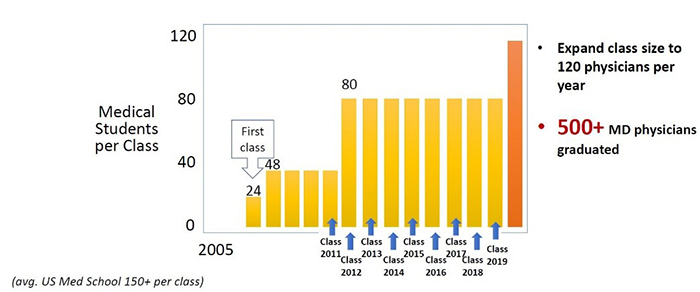
University of Arizona College of Medicine - Phoenix to Increase Class Size to 100 in 2020

The University of Arizona College of Medicine – Phoenix has received a green light from the accrediting organization for medical schools, the Liaison Committee on Medical Education (LCME), to increase its class size from 80 to 100 students in 2020.
The impetus for the increase is additional ongoing funding approved by the Arizona Legislature in the FY2020 budget to address the state’s physician shortage.
Arizona’s physician shortage is one of the worst in the nation, meeting only 42 percent of the state’s need for primary care providers. By 2030, it’s estimated that Arizona will need an additional 1,941 primary care physicians, according to the Arizona Center for Rural Health. A study by the Association of American Medical Colleges ranks Arizona 49th in the number of general surgeons.
“The vision of the College of Medicine – Phoenix has always been to increase our class size with an ultimate goal of 120,” said Steven Lieberman, MD, senior associate dean of Academic Affairs at the college. “We are excited to move forward and increase the number of compassionate and skillful physicians in the State of Arizona. This will help close the provider shortage gap and improve the quality of health care for our communities.”

Short History of the College of Medicine – Phoenix
Since it welcomed its first class of 24 in 2007, the UA College of Medicine – Phoenix has increased its class size from 48 in 2008 to 80 in 2012. The UA College of Medicine – Tucson, which is a separately accredited MD-granting school, has an average class size of 115. The increase will mean the state will graduate about 225 new physicians each year beginning in 2024.
“One of the elements we are most looking forward to with the increased class size is the ability for us to further shape our classes to be true reflections of our community,” said Glen Fogerty, PhD, associate dean of Admissions and Recruitment at the college. “Whether it be patients in rural, urban and/or underserved areas, we will be seeking students that fit our mission of serving Arizona and are passionate about these various patient populations.”
The demand for admission to medical school in the U.S. has never been greater.
The College of Medicine – Phoenix has received more than 6,100 applications for the incoming class that will begin training in July 2020. Statistics provided by the Association of American Medical Colleges reveal that U.S. medical schools received more than 53,000 applications in the 2019 application cycle compared to 42,000 10 years ago.
Guy L. Reed, MD, MS, dean of the College of Medicine – Phoenix, said even with the increased class size, Arizona will have a significant need for more doctors.
“We will still have to think of ways to expand the number of students,” he said.
Phoenix, the fifth-largest city in the U.S., had no four-year allopathic medical schools when the College of Medicine – Phoenix admitted its first class in July 2007. City leaders, along with the Arizona Board of Regents, had a bold idea to develop a biosciences campus that would bring together researchers, physicians, students, residents and fellows to improve health care in Phoenix and throughout Arizona.
The Phoenix medical school has graduated 500 physicians. Currently, the medical school enrolls only about one percent of applicants and the mean MCAT scores of the entering class are among the top 15 percent in the country. First-year medical students recorded an average MCAT score of 512, an average undergraduate GPA of 3.77 and an average science GPA of 3.74.
Topics
About the College
Founded in 2007, the University of Arizona College of Medicine – Phoenix inspires and trains exemplary physicians, scientists and leaders to advance its core missions in education, research, clinical care and service to communities across Arizona. The college’s strength lies in our collaborations and partnerships with clinical affiliates, community organizations and industry sponsors. With our primary affiliate, Banner Health, we are recognized as the premier academic medical center in Phoenix. As an anchor institution of the Phoenix Bioscience Core, the college is home to signature research programs in neurosciences, cardiopulmonary diseases, immunology, informatics and metabolism. These focus areas uniquely position us to drive biomedical research and bolster economic development in the region.
As an urban institution with strong roots in rural and tribal health, the college has graduated more than 1,000 physicians and matriculates 130 students each year. Greater than 60% of matriculating students are from Arizona and many continue training at our GME sponsored residency programs, ultimately pursuing local academic and community-based opportunities. While our traditional four-year program continues to thrive, we will launch our recently approved accelerated three-year medical student curriculum with exclusive focus on primary care. This program is designed to further enhance workforce retention needs across Arizona.
The college has embarked on our strategic plan for 2025 to 2030. Learn more.